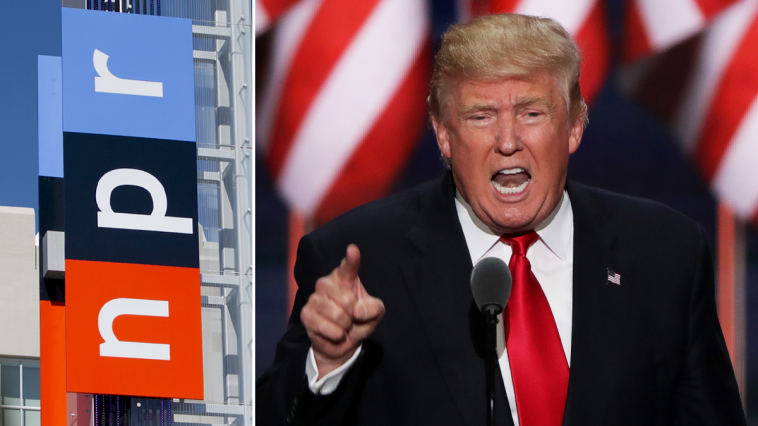President Donald Trump, presently on the campaign trail, insisted this week that National Public Radio’s (NPR) funding should be revised following a claim of alleged liberal bias made by an NPR editor. Trump made his views known via a post on Truth Social. Coincidentally, The Free Press released an op-ed where NPR’s Senior Business Editor Uri Berliner conveyed his belief that NPR had compromised the trust of Americans through its perceived liberal sway.
Interestingly, Berliner didn’t see a funding cut as the perfect panacea to the outlined ‘missteps.’ Furthermore, it is worth recalling that Trump has had a history of declaring intentions to scale back funding for public media during his tenure as president, an ambition that didn’t materialize as Congress decided against his proposals.
However, if Trump secures a second presidential term this year, the whole landscape could be redrafted. As evidenced during Trump’s opposition against a FISA bill, which the House eventually obstructed, a POLITICO report suggested that Trump is gradually imposing his influence on the GOP’s policy agenda in Congress.
Last year, when NPR decided to part ways with Twitter (now X), following labeling ties to the U.S. government, it stated that less than 1% of its annual $300 million budget is generated by the federal funding provided by the Corporation for Public Broadcasting. Despite this, NPR maintains on its website that the federal funding is ‘essential.’ Cutting off such a source of income would potentially lead to a diluted variety of programs, a reduction in quality journalism, and possibly the closure of public radio stations, particularly in rural and economically challenged communities.
In the op-ed, Berliner reflects on the rise of advocacy in the wake of Trump’s election as president in 2016, an event which saw him defeat Democratic candidate Hillary Clinton. Reinforcing his claim about bias at NPR, Berliner mentioned the multiple instances when Rep. Adam Schiff (D-CA), a recurring guest, claimed evidence of Trump’s collusion with Russia during his live interviews.
However, when the Robert Mueller report, released in 2019, found no substantial proof of such collusion, the news network provided only minimal coverage, and it subsequently ceased to follow the Russiagate narrative on its programming. Berliner stated that, while it is not uncommon for a news outlet to misread the potential impact of a story, it’s a serious misstep when false leads are pursued or when information from unreliable sources is capitalized upon.
As part of his critique, Berliner recalled an incident related to the Hunter Biden laptop story that arose before the 2020 election. According to Berliner, this story was indeed newsworthy, yet the usual journalistic fervor to pursue a heated scoop appeared to be suppressed. He recounted a conversation with NPR colleagues, during which one journalist highlighted satisfaction with the news station’s decision not to follow the story due to concerns about aiding Trump’s campaign.
Diving further into the potential bias, Berliner claimed to have discovered a surprising disparity in the political affiliations of NPR’s editorial team based in Washington D.C., the network’s headquarters. In a staff meeting, he revealed data showing that 87 Democrats and zero Republicans were in editorial positions, suggesting a diversity deficit within the team.
Yet, when he raised this concern hoping to address the issue, he was met with what he described as profound indifference. There was no argument or hostility. Rather, the response was characterized by total apathy, which Berliner viewed as even more disconcerting.
In response to the allegations, NPR’s Editor-in-Chief, Edith Chapin, made a public statement, offering a differing perspective. She, along with various NPR leadership team members, expressed a total disagreement with Berliner’s evaluation of their editorial integrity and the quality of their journalism.
Chapin didn’t shy away from defending and appreciating the work done by NPR desks and shows in narrating an array of challenging stories. Holding the stand that the organization maintains high standards, she expressed complete confidence in the professionalism displayed by the NPR team despite accusations of bias.
To sum up, the dynamic between state-funded public media and political entities continues to be a topic of intense discussion. The effectiveness and unbiased operation of these media outlets are vital to ensuring informed and balanced discourse among the public equation, but only time will tell how these events impact future policy and media sentiment.
Nonetheless, the episode presents another case study on the delicate balance between media integrity, political influence, and journalistic independence.



